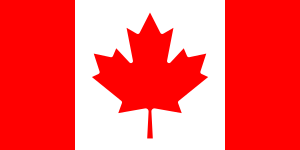Canadians

|
|
| Total population | |
|---|---|
| (Canada: 36,286,425 by the Q3 of 2016.) | |
| Regions with significant populations | |
| United States | 1,062,640 |
| Hong Kong | 300,000 |
| United Kingdom | 73,000 |
| France | 60,000 |
| Lebanon | 45,000 |
| United Arab Emirates | 40,000 |
| Australia | 27,289 |
| China | 19,990 |
| Germany | 15,750 |
| South Korea | 14,210 |
| Japan | 11,016 |
| Egypt | 10,000 |
| New Zealand | 7,770 |
| Philippines | 7,500 |
| Haiti | 6,000 |
| Mexico | 5,768 |
| Switzerland | 5,243 |
| Singapore | 5,140 |
| Thailand | 5,000 |
| Trinidad and Tobago | 5,000 |
| Belgium | 4,145 |
| Languages | |
|
Canadian English and Canadian French |
|
| Religion | |
| Multiple denominations | |
Canadian English and Canadian French
Numerous indigenous languages are also recognized.
Canadians (French: Canadiens) are the people who are identified with the country of Canada. This connection may be residential, legal, historical, or cultural. For most Canadians, several (or all) of these connections exist and are collectively the source of their being Canadian.
Canada is a bilingual and multicultural society home to people of many different ethnic, religious and national origins, with the majority of the population made up of Old World immigrants and their descendants. Following the initial period of French and then the much larger British colonization, different waves (or peaks) of immigration and settlement of non-aboriginal peoples took place over the course of nearly two centuries and continue today. Elements of Aboriginal, French, British and more recent immigrant customs, languages and religions have combined to form the culture of Canada and thus a Canadian identity. Canada has also been strongly influenced by its linguistic, geographic and economic neighbour, the United States.
Canadian independence from the United Kingdom grew gradually over the course of many years since the formation of the Canadian Confederation in 1867. World War I and World War II in particular gave rise to a desire among Canadians to have their country recognized as a fully-fledged sovereign state with a distinct citizenship. Legislative independence was established with the passage of the Statute of Westminster 1931, the Canadian Citizenship Act of 1946 took effect on January 1, 1947, and full sovereignty was achieved with the patriation of the constitution in 1982. Canada's nationality law closely mirrored that of the United Kingdom. Legislation since the mid 20th century represents Canadians' commitment to multilateralism and socioeconomic development.
...
Wikipedia
